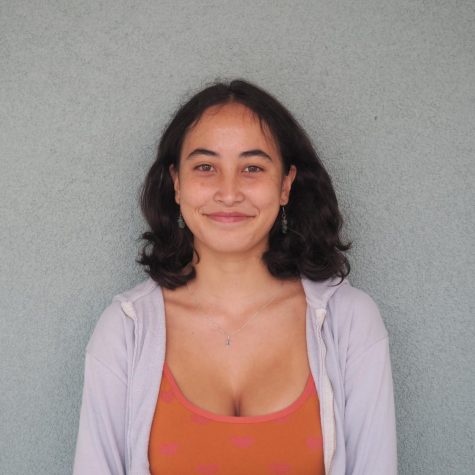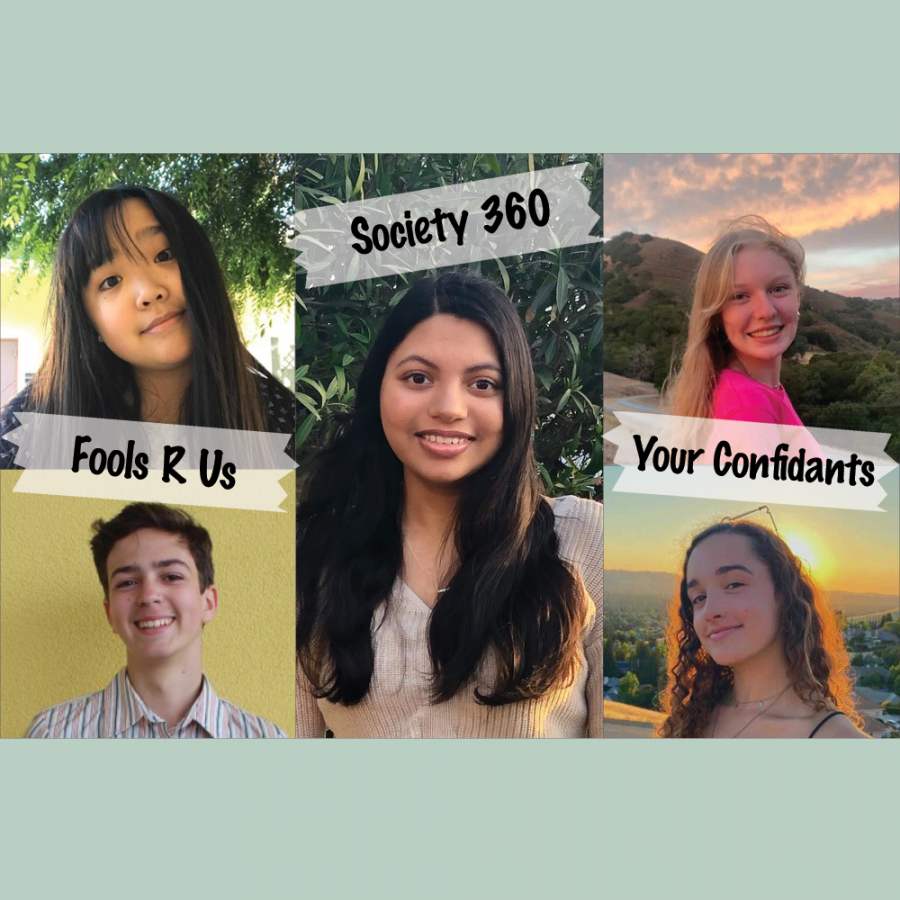Students express creativity through podcasts
From left to right: photos courtesy of Katie Brown, Quincy Rosenzweig, Anshika Agarwal, Leah Kozakevich and Soleil Lemons
Fools R Us
A myriad of harmonizing voices, singing a creative jingle, flood into the microphone: this is the way the most recent episode of “Fools R Us”—a podcast created by junior Quincy Rosenzweig and Gunn alumna Katie Brown—opens.
The Holiday Special marks the ninth episode of the podcast since it was created in July with the hopes of keeping in contact with others during a time of social isolation. While many other podcasts are created with a purpose or message in mind, Brown notes that “Fools R Us” is simply produced for fun. As such, she usually ignores the number of viewers. “We don’t care that much if people are watching [the podcast]; it is more just to chat and share what’s going on,” Rosenzweig said.
The name “Fools R Us,” which is derived from the popular island survival TV show “Survivor,” is quite indicative of Rosenzweig’s and Brown’s favorite discussion topic: “Survivor.” But in addition to ranking and debriefing of the new seasons, Rosenzweig and Brown enjoy discussing unpopular opinions, ranking desserts and simply talking about life. By doing so, Rosenzweig hopes that the podcast is a way for listeners to relax. “If they’re stressed out, or anything, it’s just a nice way to sort of chill,” he said.
Looking forward, Brown hopes to continue producing “Fools R Us.” “I think one of the biggest goals is for us to continue [the podcast] because I was in Palo Alto this semester for college, but now I’m going to college,” she said. “So, it might be a little trickier [to produce], but I believe we’ll survive.”
Society360
When you hit play, four steady beats fill the room, followed by an introduction: “Hi everyone! My name is Anshika, and welcome to ‘Society360.’” “Society360”—a podcast created to dissect pressing societal issues—has this same start to each of its 11 episodes.
Along with a few of her peers, senior Anshika Agarwal started “Society360” after COVID-19 spotlighted numerous societal
problems. “I really wanted to help break these issues down into different perspectives and be able to analyze them from different angles,” Agarwal said.
In breaking down these issues, Agarwal and the rest of the “Society360” team hope to spark meaningful discussion to inspire change. “The point of the podcast is not to oversimplify or trivialize these issues, because the work doesn’t end there,” she said. “Instead, we recognize that becoming aware is only the tip of the iceberg, in terms of advocating for large changes. For us, getting people to the first step of activism is accomplishing our goal.”
On their podcast, “Society360” has featured various individuals, ranging from student activists to Stanford professors, each of them bringing their own perspective to the table. Their episodes have discussed issues such as climate change, educational equity and the impacts of COVID-19.
In addition to their podcast, “Society360” has a blog and an Instagram page that also bring attention to the pressing issues at hand. Still, Agarwal believes that podcasts are a unique form of media that allows speakers to express themselves through thought-provoking words. “One thing that’s really unique about the podcast is that we really get to use our voices and actually have conversations and discussions that we can bring to wide audiences—a social media post or a blog post or a news article on its own can’t really have that same effect,” she said. “So, really using our voices and having important conversations that can be listened to by a lot of people, I think, has a lot of power.”
Your Confidants
With a simple play on words, the name “Your Confidants” is emblematic of the message the “Your Confidants” podcast hopes to spread: self-confidence. Released in August by juniors Leah Kozakevich and Soleil Lemons, the podcast serves to inspire those who may be struggling with body positivity and self-love.
While participating in an entrepreneurship summer program, Kozakevich noticed a lack of teen representation and discussion in body positivity podcasts. “I’ve always seen people talk about it, but they’re in a little bit of an older age demographic than us,” she said. “We didn’t see much [body positivity discussion] coming directly from high schoolers.” As a result, Lemons and Kozakevich created the podcast to reach out to the surrounding teen population.
Although it’s aimed towards teens, Lemons believes listening to “Your Confidants” is still beneficial for other age groups. “I think it’s good for other people to listen to it as well, just because they get a perspective that they didn’t have before,” she said.
With casual conversation on a multitude of topics, from skin imperfections to modern beauty standards and individualism in today’s society, Lemons and Kozakevich hope that their 11 episodes will be relatable, relaxing and eye-opening. To gain traction, Lemons and Kozakevich utilize their Instagram page to not only promote “Your Confidants,” but to further spread their message. Their Instagram page boasts over 250 followers and numerous inspiring quotes.
Although exposure is important, Kozakevich argues that impact is much more meaningful. “Even if a few people can just listen and benefit from anything we say, I think that’s being successful in a way of its own,” she said.
Your donation will support the student journalists of Henry M. Gunn High School. Your contribution will allow us to purchase equipment and cover our annual website hosting costs.

Since joining staff in Jan. 2020, Julianna Chang has been editing pages and advising staffers as a Managing Editor. In addition to devoting every spare...




